Let’s play a game of “Whose Line Was It?”
I’ll give you two recent quotes from the news, and see if you can guess who said it:
1. “It is a pity that some are so keen to harm our country for local partisan reasons.”
2. “Some people are trying to use this tragedy for their own political objectives.”
They’re from Ministers from two different countries that were once worlds apart. Not anymore.
The first quote came from Justice Minister Owen Bonnici. The second was Samad Seyidov, Azerbaijan’s head delegate at the Council of Europe.
Isn’t it remarkable how similar they sound?
I was watching the PACE hearing last week — the one where the Assembly voted overwhelmingly in favour of Special Rapporteur Pieter Omtzigt’s report on the stalled investigation into Daphne Caruana Galizia’s assassination and the rule of law in Malta.
The main MPs to raise objections were from Malta and Azerbaijan, and if I closed my eyes I could hardly tell them apart.
Azerbaijani delegates tried to make the session all about them, even though the country was not the focus of the report.
It’s a lot like the Malta government spin machine’s desperate attempt to pass Joseph Muscat’s recent humiliating defeat in his battle for a top EU post as some sort of near win. Do a little digging and you’ll quickly realise that, despite Muscat’s insistent, tireless lobbying, his name doesn’t come up in a single international news story as a short-listed candidate. Only Joseph Muscat thought it was all about him.
Azerbaijan took a similar self-deluded approach at PACE, acting as though it was the focus of an assessment on the rule of law in Malta.
Azerbaijani delegate Asim Molladze saw the entire session as some sort of attack against his country.
“I’m against Omtzigt using tragedy for his own goal,” he said. “He is participating in a hybrid war against Azerbaijan.”
Is Azerbaijan suffering from the same problem that always seems to plague poor Malta? Surely this isn’t another case of larger countries bullying a smaller country?
Former Prime Minister Alfred Sant should take comfort from the fact that the Azerbaijanis are with him in spirit when he stands up in the European Parliament and says, “factually incorrect and skewed accusations are being made about Malta, so that so-called inquiries could be launched”, and that, “investigations of this type seek to tarnish the image of the island.”
But that victim stance wasn’t the only similarity between the Azerbaijani delegates and Malta’s ruling Party.
Seyidov took a line straight out of Edward Scicluna’s phrasebook when he said, “This is an example of Omtzigt trying to mislead the international community, trying to insult Azerbaijan and the name of my President and his family to create an atmosphere that Azerbaijan is a corrupt country.”
I’d have to say that Azerbaijan is doing a pretty good job of looking like a corrupt country all by itself. They don’t need Scicluna’s South American taxi driver to reinforce the impression.
Delegate Sevinj Fataliyeva took a different approach, one that has worked very well in Malta. “I ask Omtzigt why he’s doing this,” she said. “Is it an attempt to make Azerbaijan turn away from the path of democracy, an attempt to blackmail Azerbaijan and ruin its image as a country whose economy is growing and is an energy-producing country?”
We’ve all heard that “economic success” line before. The notion that putting a little money in someone’s pocket is ample reason to overlook the source of that money.
I suppose we should also overlook the fact that some of the economic success in the Azerbaijan energy economy involves selling overpriced gas to Malta under a kickback-riddled deal described as “sinister” in the report.
But I’m sure other countries are just jealous of Azerbaijan’s success, as they are of Malta’s.
Finally, let’s not forget that old Labour Party favourite, whataboutism. It seems to be a favourite with the Azerbaijanis, too.
Here’s Samad Seyidov again: “Omtzigt mentioned my country because they’re in official negotiations with Malta, as it is with all European states, such as the UK, Italy and France. Why aren’t you including all these countries in this case?”
But Omtzigt didn’t mention Azerbaijan in his report because Malta has official negotiations with the country. No, the report concerned the “unofficial” connections — accounts held by Azerbaijani Politically Exposed Persons in Malta’s Pilatus bank, and the Electrogas affair involving Azerbaijan, 17 Black, Konrad Mizzi and Keith Schembri.
Seyidov’s whataboutism was just smoke and mirrors.
I understand why Azerbaijan and Malta are such good friends. It wasn’t just the financial convenience of moving money discretely through Pilatus bank, though that certainly helped.
No, Azerbaijan and Malta get along so well because they share the same worldview and read their lines from the same tired playbook.
Representatives from both countries try to distract listeners by targeting the messenger because they can’t refute the message.












